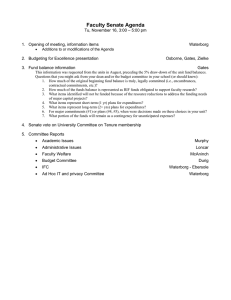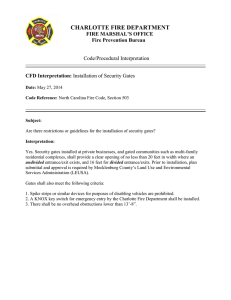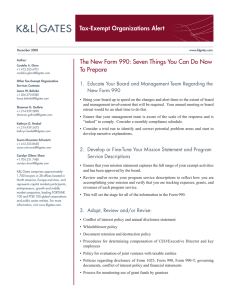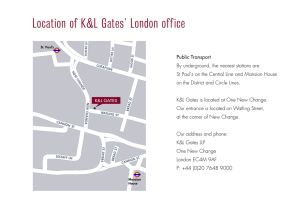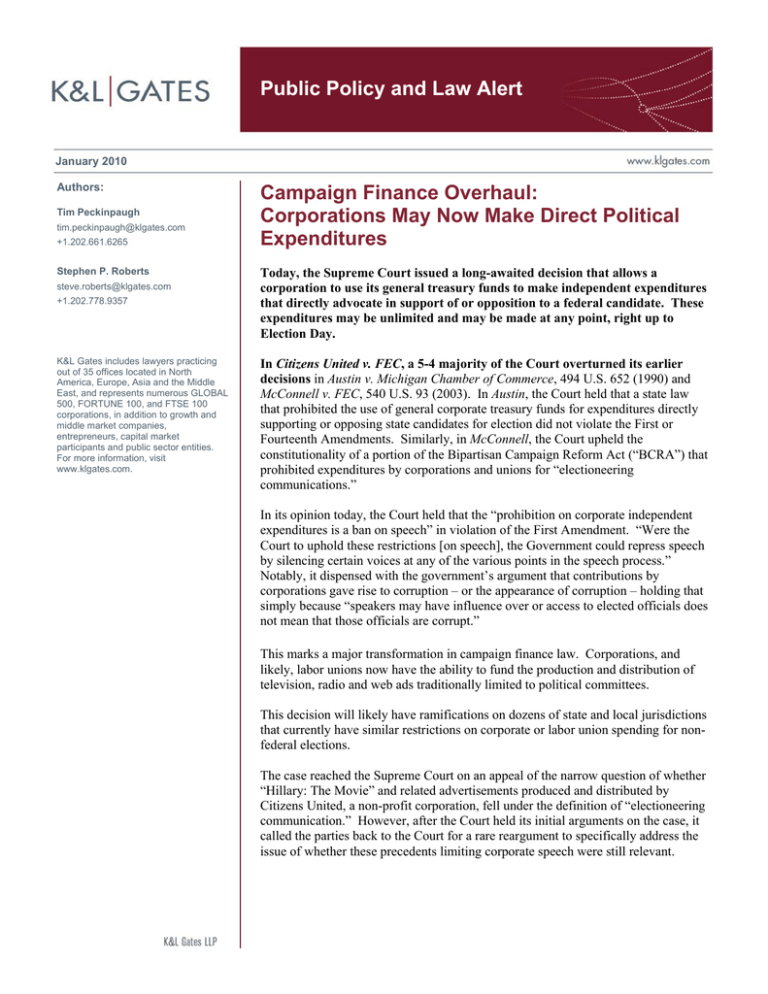
Public Policy and Law Alert
January 2010
Authors:
Tim Peckinpaugh
tim.peckinpaugh@klgates.com
+1.202.661.6265
Stephen P. Roberts
steve.roberts@klgates.com
+1.202.778.9357
K&L Gates includes lawyers practicing
out of 35 offices located in North
America, Europe, Asia and the Middle
East, and represents numerous GLOBAL
500, FORTUNE 100, and FTSE 100
corporations, in addition to growth and
middle market companies,
entrepreneurs, capital market
participants and public sector entities.
For more information, visit
www.klgates.com.
Campaign Finance Overhaul:
Corporations May Now Make Direct Political
Expenditures
Today, the Supreme Court issued a long-awaited decision that allows a
corporation to use its general treasury funds to make independent expenditures
that directly advocate in support of or opposition to a federal candidate. These
expenditures may be unlimited and may be made at any point, right up to
Election Day.
In Citizens United v. FEC, a 5-4 majority of the Court overturned its earlier
decisions in Austin v. Michigan Chamber of Commerce, 494 U.S. 652 (1990) and
McConnell v. FEC, 540 U.S. 93 (2003). In Austin, the Court held that a state law
that prohibited the use of general corporate treasury funds for expenditures directly
supporting or opposing state candidates for election did not violate the First or
Fourteenth Amendments. Similarly, in McConnell, the Court upheld the
constitutionality of a portion of the Bipartisan Campaign Reform Act (“BCRA”) that
prohibited expenditures by corporations and unions for “electioneering
communications.”
In its opinion today, the Court held that the “prohibition on corporate independent
expenditures is a ban on speech” in violation of the First Amendment. “Were the
Court to uphold these restrictions [on speech], the Government could repress speech
by silencing certain voices at any of the various points in the speech process.”
Notably, it dispensed with the government’s argument that contributions by
corporations gave rise to corruption – or the appearance of corruption – holding that
simply because “speakers may have influence over or access to elected officials does
not mean that those officials are corrupt.”
This marks a major transformation in campaign finance law. Corporations, and
likely, labor unions now have the ability to fund the production and distribution of
television, radio and web ads traditionally limited to political committees.
This decision will likely have ramifications on dozens of state and local jurisdictions
that currently have similar restrictions on corporate or labor union spending for nonfederal elections.
The case reached the Supreme Court on an appeal of the narrow question of whether
“Hillary: The Movie” and related advertisements produced and distributed by
Citizens United, a non-profit corporation, fell under the definition of “electioneering
communication.” However, after the Court held its initial arguments on the case, it
called the parties back to the Court for a rare reargument to specifically address the
issue of whether these precedents limiting corporate speech were still relevant.
Public Policy and Law Alert
Answering the question of whether such a sweeping
decision was necessary, in its opinion the Court
claimed that it “cannot resolve this case on a
narrower ground without chilling political speech,
speech that is central to the meaning and purpose of
the First Amendment.”
It is important to understand that the Court did not
address corporate campaign donations. A
corporation’s PAC accounts are still the only method
by which a corporation may directly contribute to a
federal candidate. In addition, while the Court’s
decision clears the way for corporate funds to be
spent on express advocacy on behalf of or against a
federal candidate, any corporate advocacy must be
made independent of the campaign. In short,
corporations won’t suddenly be able to write a
million dollar check to a Senate campaign from their
general revenues. Direct contributions to federal
candidates still must be made through the
corporation’s PAC.
A corporation looking to act with the freedom
granted by this decision should proceed cautiously.
The Federal Election Commission may still consider
issuing regulations implementing the Court’s
holding which could take several months. If so, the
specifics of compliance may not be decided until
late into the 2010 election cycle.
Finally, the decision did uphold certain disclosure
requirements on these ads. A corporation spending
over $10,000 in a year to produce or air election
advertisements as regulated by the Federal Election
Commission will still be required to file a report
with that body disclosing the names and addresses
of anyone who contributed $1,000 or more for
production or distribution expenses. Additionally,
the advertisement must contain a disclaimer stating
who is responsible for its content, along with the
name and address of the group airing the ad.
Anchorage Austin Beijing Berlin Boston Charlotte Chicago Dallas Dubai Fort Worth Frankfurt Harrisburg Hong Kong London
Los Angeles Miami Moscow Newark New York Orange County Palo Alto Paris Pittsburgh Portland Raleigh Research Triangle Park
San Diego San Francisco Seattle Shanghai Singapore Spokane/Coeur d’Alene Taipei Tokyo Washington, D.C.
K&L Gates includes lawyers practicing out of 35 offices located in North America, Europe, Asia and the Middle East, and represents numerous
GLOBAL 500, FORTUNE 100, and FTSE 100 corporations, in addition to growth and middle market companies, entrepreneurs, capital market
participants and public sector entities. For more information, visit www.klgates.com.
K&L Gates is comprised of multiple affiliated entities: a limited liability partnership with the full name K&L Gates LLP qualified in Delaware and
maintaining offices throughout the United States, in Berlin and Frankfurt, Germany, in Beijing (K&L Gates LLP Beijing Representative Office), in
Dubai, U.A.E., in Shanghai (K&L Gates LLP Shanghai Representative Office), in Tokyo, and in Singapore; a limited liability partnership (also named
K&L Gates LLP) incorporated in England and maintaining offices in London and Paris; a Taiwan general partnership (K&L Gates) maintaining an
office in Taipei; a Hong Kong general partnership (K&L Gates, Solicitors) maintaining an office in Hong Kong; and a Delaware limited liability
company (K&L Gates Holdings, LLC) maintaining an office in Moscow. K&L Gates maintains appropriate registrations in the jurisdictions in which its
offices are located. A list of the partners or members in each entity is available for inspection at any K&L Gates office.
This publication is for informational purposes and does not contain or convey legal advice. The information herein should not be used or relied upon
in regard to any particular facts or circumstances without first consulting a lawyer.
©2010 K&L Gates LLP. All Rights Reserved.
January 2010
2


